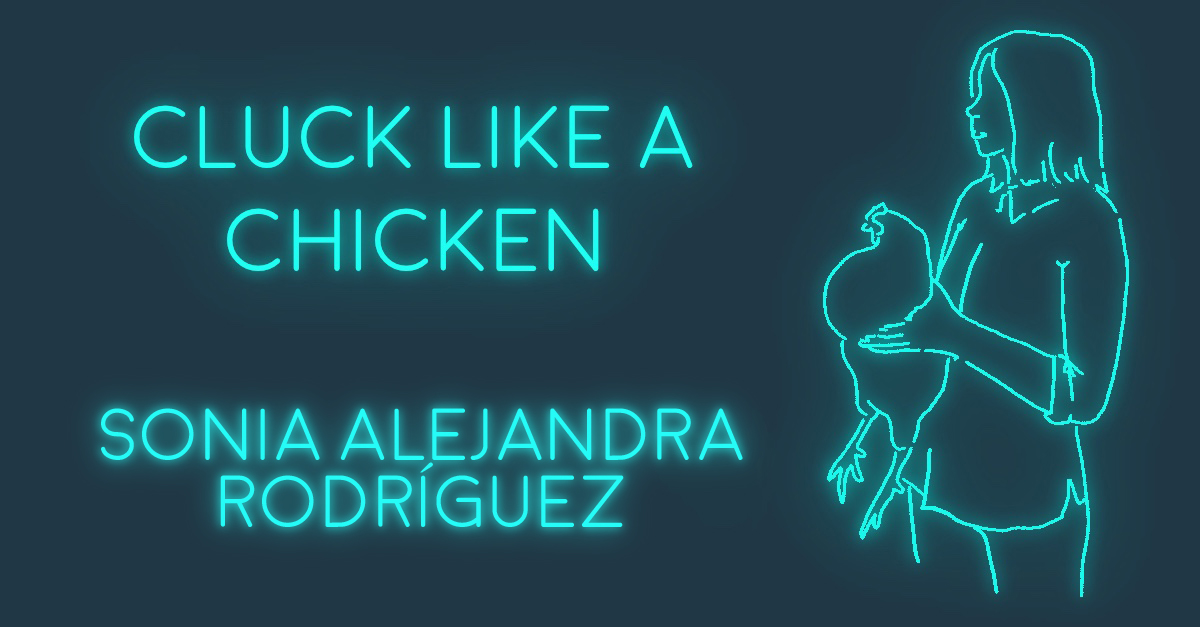Back in your dorm, after the “how to not get raped” workshop offered by Student Affairs, you google chickens. The coach brought in to teach the women to defend themselves ended his talk by saying, “And if all else fails, cluck like a chicken.”
You leave knowing there’s no physical way you can overpower an attacker. You won’t be able to use their weight against them, flipping them over your back like some WWE match. You won’t be able to thrust the thick part of your palm against their nose hard enough to do any damage. You won’t even be able to hit them in the groin because you lack aim. You’re left with learning to cluck like a chicken.
You’re in luck: there are 122,000 videos on the subject. You quickly learn that most people assume chickens go “cluck cluck cluck” or “bawk, bawk, bawk.” Most of the people in the videos shake their heads like chickens pecking the bright blue sky. Some people puff up their cheeks when they bawk. Do chickens have cheeks? you wonder. Other people flap their arms like wings but you can’t recall ever seeing chickens walk that way. But you’ve only seen chickens on TV so what do you know? It can’t be as simple as “cluck” and “bawk” and the chicken dance. Because that would have meant you’ve known how to defend yourself this entire time.
The videos with actual chickens in them seem more reliable. One chicken with black feathers and a red face catches your attention. If this wasn’t serious business, you’d laugh your butt off because it looks like the chicken is wearing lipstick and the shine on its feathers makes you think of gel on jet black hair. You imagine the chicken getting ready to cross the road. Focus! You screech to yourself and tap your head in the way you do when you get spacey. The fancy chicken bawks. It definitely doesn’t have cheeks (although the red face makes it look like it’s wearing too much blush. Focus!) Certainly doesn’t flap its wings. But it does shake its tail feathers. After watching the video on repeat a dozen times, you want to laugh or cry because the fancy chicken looks like it’s having a good time at some dance. You start to worry that something might happen to the chicken. That the chicken is so lost in its own happiness that it won’t notice another chicken sneaking up to snatch it all away.
A tall woman at the workshop asked, “What if it’s not full-on rape? That’s still like bad, right?”
You don’t know her name but she lives on your floor. You’ve seen her walking around the shared bathroom with a towel on her head. You convince yourself her towel is red to match the combs chickens have at the top of their heads. She looks like a “bawk” kind of girl for sure. Even though some of the other girls giggled and others scoffed, you perked up because that was your question, too. But you were too chicken to ask. You were the wrong kind of chicken.
The coach said, “That’s complicated,” and told her to stay after.
When the coach asked if anyone had any questions, you had a million of them running through your head. But none of them made it to your mouth. When everyone was dismissed and some girls stayed after to talk to the coach or to each other, you wanted to stay and listen because you didn’t even know how to ask the questions that burned inside of you.
For a second, you consider googling your questions: What if you were drunk and don’t remember the details? What if you had said yes and then no and then they didn’t stop? What if you went over to their place and didn’t consent to the kind of sex they wanted to have? What if it was the relative of a friend? What if it was someone you met online? What if you can’t scrub the scent of cigarettes from your body, from your nostrils, from your brain? What if you can’t tell if it’s a nightmare or a repressed memory? What if it’s become easier and easier to leave your body behind?
You search for chickens in your area instead. You want to learn to cluck like a chicken from the original source. There’s a grocery store a few miles away that sells live chickens. There’s a bus leaving in 28 minutes that’ll take you there. But you don’t want to buy a chicken because you have nowhere to put it. Although walking around with a chicken might solve your “how to” problem. You imagine taking your chicken to class, to the library, to the bar–pecking its tiny head with tiny chicken sunglasses everywhere you go. In your dorm room, you’re alone. You already miss an imaginary chicken bodyguard you’ve named Henry.
By now you’ve learned about the Sussex chicken, the Burmese chicken, the Rhode Island chicken. You wonder if chickens cluck differently in different countries. You search “que sonido hacen las gallinas” to see if chickens sound different in Spanish. You consider asking your mother if she had to learn to cluck like a chicken in Mexico. “Cacarear” already sounds like a better weapon than “cluck.” You come across an amateur Mexican wrestler who dresses like a chicken. She leaps from the ropes, spreads her wings, and shouts, “Pio, pio, pio!” You watch all of Gallina Voladora’s videos. In an interview she says, “Chickens do fly! You’re not a chicken, so what the cluck do you know?”
Even though you haven’t learned to cluck like a chicken, that doesn’t stop you from ordering a few chicken costumes online.
Before going to bed, you sign up for one-on-one tutoring with a chicken at a local farm. All else has failed. You’ve said no. You’ve screamed. You’ve told someone afterwards. You’re left with learning to cluck like a chicken.

